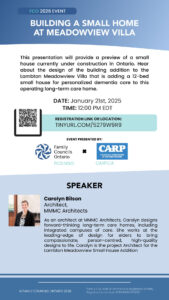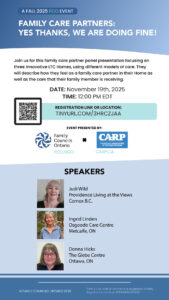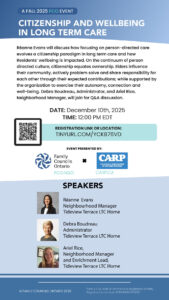Welcome to Change LTC Now, where we advocate for transforming long-term care homes from institutions to homes. This change will enrich the quality of life for residents, families, and staff!
CARP’s ADVOCACY WORKING GROUP ON LONG-TERM CARE
Who we are
We are CARP’s Advocacy Working Group on Long-term Care in Ontario. CARP, the Canadian Association of Retired Persons, is one of Canada’s largest non-profit, advocacy organizations with approximately 230,000 members.
What do we want to accomplish
Our goal is to influence change in Ontario’s long-term care homes from Institutions to Homes. This means transitioning from the traditional institutional/medical/task-oriented model of care to a person-centred approach.
Why are we doing this
The pandemic brought to light the systemic problems in long-term care homes that plagued the system for over four decades. Residents, families and staff deserve to live, visit and work in a warm, compassionate and home-like environment.
When
The time to act is NOW. After two years of horrific tragedies, if we don’t begin to fix the long-term care system now, the residents, family and staff will be forgotten once again for decades or until another pandemic hits.
How will we do this?
There are innovative models of care in Ontario and around the world that have transitioned from ‘institutions to homes’ with reported better outcomes. Working with like-minded organizations, we will increase awareness of the benefits of these existing homes to influence decision-makers to support and fund other long-term care homes to follow suit.
Make a Difference!
YOU—as concerned citizens and informal caregivers—have the power to motivate change. Working together, we can advocate for Ontario’s government to embrace innovative models of care and champion the transformation of long-term care homes from institutions to homes.
Recent Blog Posts
- Webinar: Building a Small Home at Meadowview Villa
 Please join us on January 21 at 12:00 EDT for our webinar presented by an architect on a small home build in Ontario
Please join us on January 21 at 12:00 EDT for our webinar presented by an architect on a small home build in Ontario - Recording: Family care partners: Yes thanks, we are doing fine!
 Listen to the positive experiences and personal stories that three family care partners share from their long-term care homes.
Listen to the positive experiences and personal stories that three family care partners share from their long-term care homes. - Webinar: Citizenship and Well-being in Long-Term Care
 Please join us to learn how residents’ well-being is impacted by person-directed care and see what is happening in one LTC home that is successfully implementing this approach!
Please join us to learn how residents’ well-being is impacted by person-directed care and see what is happening in one LTC home that is successfully implementing this approach!

